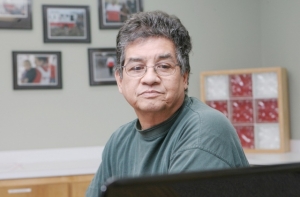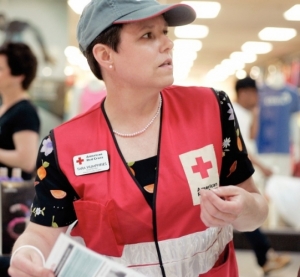Local residents know firsthand how tough it can be to put a town back together
By Becky Barclay
Published in News on May 22, 2013 1:46 PM

News-Argus/CASEY MOZINGO
"We listened to them, to their story. In times like that, people have to talk." -- Roberto Mendoza on some of the unsung services Red Cross volunteers provide to disaster victims

News-Argus/BOBBY WILLIAMS
Red Cross volunteer Tara Humphries collects money Tuesday to help the organization assist in the disaster relief efforts that are currently under way in Oklahoma.
Roberto Mendoza will always remember the day he talked to a couple after a tornado hit Snow Hill.
It was two years ago, but he can still hear them recount how they were in their home when the wife was picked up and thrown into a ditch in the front yard -- her husband, tossed into a field dozens of feet behind her.
He remembers how when volunteers found him, he was in a coma -- a condition he would remain in for three days.
Disaster responders, like Mendoza, will never forget.
"When I saw him, he was all cut up. He looked like somebody took a razor and just sliced him all over his face and arms," Mendoza said of that particular victim. "A lot of houses were completely destroyed. One ... had a tree that went right down the middle of the house from one end to the other. I talked to the lady who was in the house at the time. She said all she heard was a crash. She got up and looked and saw a tree trunk sitting right there in her living room."
But another scene -- a house that was turned 180 degrees off its foundation and had been thrown some 50 feet away -- left him in awe of the "widespread destruction" Mother Nature can deliver.
"It was unbelievable," Mendoza said.
The hardship, though, is not the only thing he will always remember.
He also saw a massive relief effort that, during his three days with the Red Cross Emergency Response Vehicle, he was among those participating in -- how food, snacks, drinks, gloves, tarps, brooms and other items were distributed to those in need, thanks to donations made to the organization.
And he was a shoulder to cry on for those who really needed one.
"The people we fed said they appreciated what we did. We even had ... cars stop right in the middle of the road and thank us for helping the people," Mendoza said. "We listened to them, to their story. In times like that, people have to talk. It's a major disaster in their lives; they have to talk. We listened.
"You really don't get over something like that. You just learn to accept it. It's just part of what happens. I still hurt for the victims."
*
Tara Humphries can still see the little boy at the Red Cross shelter who wanted to watch TV in the rec room, but was too afraid to go in because of the windows.
His house had just been destroyed by a tornado and glass had flown everywhere.
She can still see the teenage girl who would not talk -- the one who saw the tornado coming through the back door of her home.
She remembers giving her a pad of paper, how she told her to write down everything she remembered about the event.
"She sat there into the night writing and the next morning she gave me pages and pages," Ms. Humphries said. "I folded them, gave them back to her and told her in a year to look at them again."
Ms. Humphries, too, has memories from Snow Hill.
It isn't just the disaster victims who feel the pain, she said.
Destruction and loss touch everybody -- from Red Cross volunteers and law enforcement officials to rescue personnel.
"By the time I got to Greene County, it was pitch black. As I was coming into Snow Hill, there were no lights; all the power was out," she said. "It was scary. I couldn't see the street signs, but law enforcement was in the road and directed me to the shelter, which had been set up at the armory."
But when she arrived at the shelter, Ms. Humphries couldn't get out of her car.
She just sat there ... crying.
"What I had seen was unbelievable," she said. "This wonderful little town I knew, what I could make out from the law enforcement headlights and my own headlights, it's something you never want to see."
The next morning, the Salvation Army brought food to the shelter and Ms. Humphries helped feed the victims.
"Many were still covered in mud coming out of their homes," she said.
And over the next few days, she went out with the Red Cross Emergency Response Vehicle, seeing even more devastation.
"Every night I when I would get home, I would be so thoroughly exhausted," she said. "But in a strange way, also satisfied. Nothing makes me crazier than for people to be hurt and I can't do anything about it."
She couldn't let her emotions get in the way of helping the tornado victims.
Ms. Humphries still rides through Snow Hill every now and then.
Each time she does, she remembers where a house was off its foundation or where a car was through the front of a business.
And then she sees the school and, again, weeps -- just as she did that first night at the shelter.
"But I wouldn't be human if I didn't," she said. "You can't be a robot about it."
Just as when you have been at ground zero, those memories find their way to the surface when disaster -- like the recent tornado in Oklahoma -- strikes around the world.
"It takes me back in the sense that I know what kind of devastation there can be and I know I have skills that can be used there. I can relate, and I think that's valuable, too," she said. "I feel for the victims of the Oklahoma tornadoes. I can't envision it being a mile wide, but I know what it looks like when there's nothing left of a house. I know what it looks like when a little girl has twisted her ankle because she ran from the tornado and fell. I know what grateful people look like."
